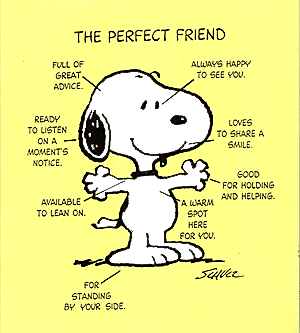The search for happiness
What is happiness anyway?
The creator of Snoopy had a great answer…
“Happiness is a warm puppy.” ― Charles M. Schulz
Some people might not agree. In fact, happiness has been the subject of philosophers, economists and psychologists.
Is happiness a philosophical concept or an economic concept?
Long ago, the Greek philosophers defined happiness differently than we do today. Happiness or “eudaimonia” meant “the state of having a good, indwelling spirit.” The essential question that explains their definition might be “How ought I to live? This defining premise–that happiness is something inherent in a person and how that person interacts with the world–continued for a long time. Only in the 18th and 19th century did philosophers ask a different question. Happiness became something that could be obtained outside oneself. The defining question changed to “What do I really want?” Utilitarianism defined happiness by the absence of pain, having wealth or being healthy.
In this way, the study of happiness moved out of philosophy, into the fields of psychology and economics. The heart of the psychologists’ definition is relationships or “good functioning” while economists center their definition on the satisfaction experienced by the consumer with a good or with something that satisfies human wants.
Because of these varying meanings and the time factor involved, –that is, the difference between being happy yesterday versus being happy with the whole of your life, –it is difficult to actually measure happiness. However, the United Nations has been giving it a try. First, in 2011 they passed a resolution inviting members to measure their population’s happiness to help them guide public policies. Second, in 2012 another meeting on happiness and well-being occurred and the first World Happiness Report was published. At that time, a discussion of how to measure happiness occurred and guidelines were published.
These guidelines then were used to produce the 2013 World Happiness Report. The questions actually measured positive affect (How happy did you feel yesterday?) negative affect (How unhappy did you feel yesterday?) and then a whole life evaluative question (Are you happy with your life as a whole?). Taken together, these become the primary measure of well-being.
“Whoever is happy will make others happy.”
There are loads of books describing how to be happy or become happier. As an example, The Happiness Project is both a blog and a book. Its author, Gretchen Rubin, chronicles her year-long quest for happiness. Like many of these books, she provides tips for the novitiate in the pursuit of happiness. For example she suggests getting enough sleep as important to happiness, rightly noting that it is hard to be happy if you are exhausted.
Other books have been penned by, what has been termed “happiness-industry stalwarts,” like M. Scott Peck’s “The Road Less Traveled” and Daniel Gilbert’s “Stumbling on Happiness.” The self-help book market in the US is estimated to be worth more than $10 billion a year…in the UK it has earned around £60 million in the past 5 years.
The World Happiness Report 2013
Findings of the World Happiness Report 2013 provide an important perspective on the happiness literature. Six factors explained 75% of the differences between nations in their happiness or well-being life evaluations. They were “income (GDP per capita), years of healthy life expectancy, having someone to count on in times of trouble (sometimes referred to as “social support”), perceptions of corruption, prevalence of generosity, and freedom to make life choices.”
They were able to parcel out the importance that these different factors had on the time distinctions of happiness–life evaluations, positive affect and negative affect. Life evaluations were closely aligned with measures of human development, that is, income and healthy life expectancy. They found that having someone to count on and the sense of freedom impacts both emotions (how do you feel today?) and life evaluations. Perceptions of corruption impact both negative feelings and make life evaluations lower and generosity is linked to positive affect and positive life evaluations. Generosity does not impact negative feelings. These results describe a more basic, even primal rationale for positive and negative “life evaluations.”
Finally, the authors found that many people the world over suffer from mental illness. In fact, 10% are dealing with anxiety disorders and/or clinical depression. Based on this estimate, the report states that mental illness has huge economic and social impact. Interventions to help those with mental illness cost comparatively little.

“With mirth and laughter let old wrinkles come.” ― William Shakespeare
So, what is the take-away? Although Venezuela’s new governmental office, Vice Ministry for the Supreme Social Happiness, is being criticized by some, the United Nations interest in measuring world happiness is intriguing.
The NEF (the new economics foundation), whose tagline is “Economics as if people and the planet mattered” is also saying something about happiness. As Charles Seaford, CEO of Well-being for NEF states, “we need to go back to fundamentals…and ask how efficient different forms of economic (and other social) activity are at delivering what we really want (i.e. well-being,the good life).” Seaford writes that if governments would prioritize happiness over economic growth, they might try to keep employment stable or protect the environment so that people could enjoy nature.
economic (and other social) activity are at delivering what we really want (i.e. well-being,the good life).” Seaford writes that if governments would prioritize happiness over economic growth, they might try to keep employment stable or protect the environment so that people could enjoy nature.
Actually, Bhutan is a small s a landlocked country in South Asia that has defined their primary measure as Gross National Happiness.
Happiness is when what you think, what you say, and what you do are in harmony.
Mahatma Gandhi







Happiness is not just a Feeling, Happiness is a mind set. To be happy, it lifts my spirits personally To enjoy nature, walks, meeting people, feeling the sun on my face, the wind at my back, the sound of rain and thunder, or birds singing.
Happiness results from looking outside of your own circumstances and learning about those around you – some who have serious issues in life and yet smile, keep going, keep reaching out to others.
Happiness is enhanced by giving to others whether it’s a door opened, a cell phone lent for a phone call to a stranger in need, reaching out a hand to help to those around you – definitely makes one feel happy to have made a difference.
Not everyone has the life they want, or the income they want, or the relationship they want, but despite that…they look for ways to give to others, volunteer, support and encourage. Be happy in each moment! Be grateful!
That’s my personal philosophy…:)
Looking outside one’s own circumstances and giving…love your personal philosophy. Thanks for reading and commenting 🙂
What an *interesting* and educational piece! We were just talking today about how the meaning of individual words and concepts has changed as language evolves, and I love the way you worked that into the post. I also caught the importance of mental health for happiness and satisfaction at both individual and national levels. Thank you for bringing attention to this report and those important findings.
Thank you so much for commenting and adding your insights to this discussion!
What a great article and important topic. To me, people who view life as an opportunity to make a difference are the ones who are most happy, particularly if they are honestly concerned with the greater good, not just satisfying their own needs by manipulating others. History offers an unending supply of “good” achieved under a false premise! Of course, mental illness robs many of the tools they need to live in peace, and our health care system must eradicate stigma and strive to correct these inequities.
To me, keeping an outward focus, appreciating the small things, and embracing a life’s purpose, big or small, go a long way toward happiness.
I love your definition! Thanks for sharing here. Having experienced your close call with SCADs and the efforts you are making to increase research on this disease, I really appreciate your insights!
Sometimes we really don’t know what will make us happy. We think it’s one thing, and then when we achieve that, we find out we didn’t hit the mark. Journaling can help us zero in on what we REALLY feel and what we REALLY want. There may be times when we subconsciously think that what will make us happy is not possible – when we really don’t know if that is true.
Writing and journaling does bring us into focus. Thanks for your comment.
Kathleen,
Two ideas that you raise really jumped out at me. The first is that happiness is something that we define–which means that the definition can change and shift. And the other is that neglecting mental health needs is a risk to the happiness not just of individuals, but an entire culture.
Warmly,
Ann
Thank you for commenting Ann. I couldn’t have said it better myself. Kathleen
I believe that happiness can be found anywhere, thanks
This was an incredible article and I really enjoyed the happiness chart with Snoopy! I like to myself as a fairly optimistic person, and life in general just really makes me happy. I recently completed a move across country with my fiancee and we couldn’t be more pleased with how things are already turning out in our new home! Thank you for sharing this.
With my focus on end of life, and preparations for making it as peaceful as possible, I regularly come across the concept of ‘values’ as relates to life’s end: ‘What are your values and beliefs?’ is the the rallying cry. This is not easy to articulate – especially since many know not how to be sufficiently self-reflective. Much easier, I thought, was, ‘what makes me happy’. As I (continue to) work through and on http://www.BestEndings.com, I have put much thot into what elements, at the end of the day, made up a ‘good day’ – what made me happy. It amounts to a series of more or less small pleasures: stimulating conversation, exercise, fresh air, laughter, hugs, patting a dog, and feeling productive (this assumes enough sleep and good eats). Sometimes each of these things take but minutes, (I mailed the letter: I was productive) and sometimes I don’t get ’em all in one day. But the result is that by paying attention and identifying the specifics, if I’m feeling less than happy or out of sorts I have – and very much appreciate – ways to get my happy back.
Thanks for (yet another) intriguing, thought-provoking post.